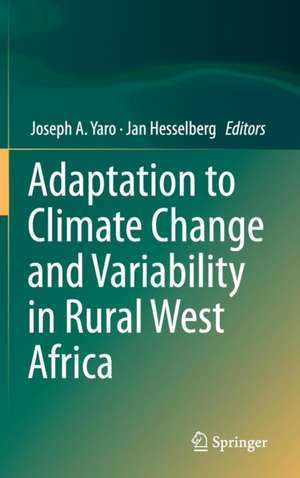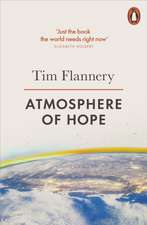Adaptation to Climate Change and Variability in Rural West Africa
Editat de Joseph A. Yaro, Jan Hesselbergen Limba Engleză Hardback – 21 apr 2016
This book presents conceptual and empirical discussions of adaptation to climate change/variability in West Africa. Highlighting different countries’ experiences in adaptation by different socio-economic groups and efforts at building their adaptive capacity, it offers readers a holistic understanding of adaptation on the basis of contextual and generic sources of adaptive capacity.
Focusing on adaptation to climate change/variability is critical because the developmental challenges West Africa faces are increasingly intertwined with its climate history. Today, climate change is a major developmental issue for agrarian rural communities with high percentages of the population earning a living directly or indirectly from the natural environment. This makes them highly vulnerable to climate-driven ecological change, in addition to threats in the broader political economic context. It is imperative that rural people adapt to climate change, but their ability to successfully do so may be limited by competing risks and vulnerabilities. As such, elucidating those vulnerabilities and sources of strength with regard to the adaptive capacities needed to support successful adaptation and avoid maladaptation is critical for future policy formulation. Though the empirical discussion is geographically based on West Africa, its applicability in terms of the processes, structures, needs, strategies, and recommendations for policy transcends the region and provides useful lessons for understanding adaptation broadly in the developing world.
| Toate formatele și edițiile | Preț | Express |
|---|---|---|
| Paperback (1) | 638.57 lei 6-8 săpt. | |
| Springer International Publishing – 22 apr 2018 | 638.57 lei 6-8 săpt. | |
| Hardback (1) | 644.82 lei 6-8 săpt. | |
| Springer International Publishing – 21 apr 2016 | 644.82 lei 6-8 săpt. |
Preț: 644.82 lei
Preț vechi: 758.60 lei
-15% Nou
Puncte Express: 967
Preț estimativ în valută:
123.38€ • 128.83$ • 101.89£
123.38€ • 128.83$ • 101.89£
Carte tipărită la comandă
Livrare economică 16-30 aprilie
Preluare comenzi: 021 569.72.76
Specificații
ISBN-13: 9783319314976
ISBN-10: 3319314971
Pagini: 244
Ilustrații: XII, 244 p. 35 illus., 27 illus. in color.
Dimensiuni: 155 x 235 x 16 mm
Greutate: 0.54 kg
Ediția:1st ed. 2016
Editura: Springer International Publishing
Colecția Springer
Locul publicării:Cham, Switzerland
ISBN-10: 3319314971
Pagini: 244
Ilustrații: XII, 244 p. 35 illus., 27 illus. in color.
Dimensiuni: 155 x 235 x 16 mm
Greutate: 0.54 kg
Ediția:1st ed. 2016
Editura: Springer International Publishing
Colecția Springer
Locul publicării:Cham, Switzerland
Cuprins
Introduction to book.- What’s on the 5th IPCC report for West Africa?.- Climate Change over West Africa: Recent Trends and Future Projections.- Seasonal variability: Impacts, adaptations and the sustainability challenge.- An assessment of determinants of adaptive capacity to climate change/variability in the rural savannah of Ghana.- Climate Change, Local knowledge and Climate Change Adaptation in Ghana.- Building Bonds and Breaking Bridges: Community Based Adaptation (CBA) as a source of conflict in a northern Ghanaian landscape.- Climate Change Adaptation, Education, and Rural Transformation in Northern Ghana. Moving beyond an agricultural focus.
Textul de pe ultima copertă
This book presents conceptual and empirical discussions of adaptation to climate change/variability in West Africa. Highlighting different countries’ experiences in adaptation by different socio-economic groups and efforts at building their adaptive capacity, it offers readers a holistic understanding of adaptation on the basis of contextual and generic sources of adaptive capacity.
Focusing on adaptation to climate change/variability is critical because the developmental challenges West Africa faces are increasingly intertwined with its climate history. Today, climate change is a major developmental issue for agrarian rural communities with high percentages of the population earning a living directly or indirectly from the natural environment. Thismakes them highly vulnerable to climate-driven ecological change, in addition to threats in the broader political economic context. It is imperative that rural people adapt to climate change, but their ability to successfully do so may be limited by competing risks and vulnerabilities. As such, elucidating those vulnerabilities and sources of strength with regard to the adaptive capacities needed to support successful adaptation and avoid maladaptation is critical for future policy formulation. Though the empirical discussion is geographically based on West Africa, its applicability in terms of the processes, structures, needs, strategies, and recommendations for policy transcends the region and provides useful lessons for understanding adaptation broadly in the developing world.
Caracteristici
Focuses on adaptation to climate change in West Africa Provides theoretical/conceptual insights on risks, adaptation, resilience, and climate change Offers well-founded knowledge on critical aspects of climate change Integrates different aspects of adaptation - practices, determinants, consequences, and policy options Includes supplementary material: sn.pub/extras










